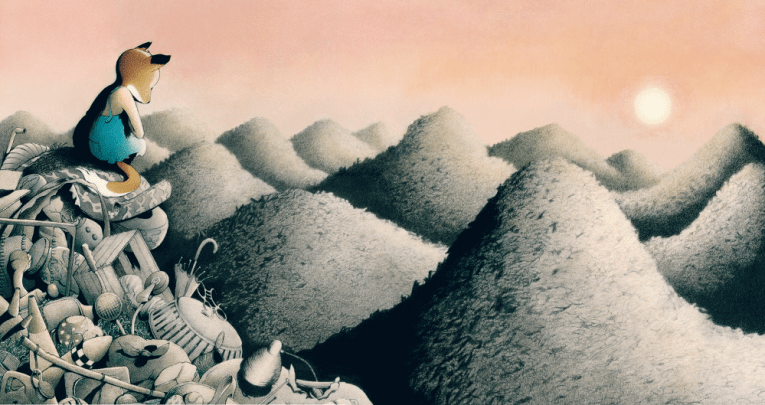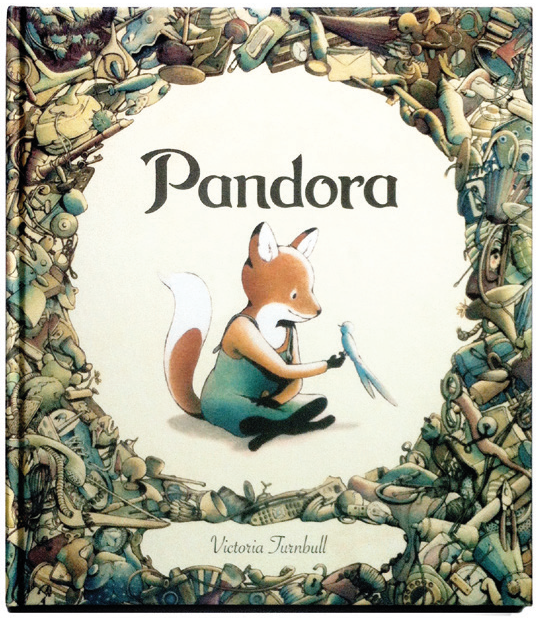Picture Books Provide A Safe Place To Explore Those Difficult Emotions That Are Hard To Put Into Words

Pandora author Victoria Turnbull takes a long look at loneliness in literature

Pandora is the story of a fox who lives alone in a desolate landscape of broken things.
She builds herself a home out of discarded objects, but remains lonely until the day a stranger arrives in need of help. Pandora takes the little bird into her home and nurses him back to health. The two become friends, and she is heartbroken when the visitor leaves. But then the gifts her friend has left begin to to grow, and her world changes forever.
I didn’t set out with the intention of speaking to children on the subjects of sadness and loneliness when I wrote Pandora. For me, it was primarily a book about friendship and regeneration.
Writing and illustrating is a solitary experience, one where I’m removed from my audience. How a reader will react to my work is not something I give too much thought to during the creative process. I fear it could steer me down the wrong path; it’s about exploring inwards.
However, I was preoccupied with my own feelings of loneliness at the time of writing the book, having found myself temporarily homeless and adrift at the end of a relationship. Like my protagonist, I was forced to make my home among someone else’s things and, perhaps inevitably, this experience found its way into the narrative I was writing.
There is a world of difference between loneliness and solitude. I find solitude essential for creativity. It’s possible to develop a positive sense of aloneness and the capacity to enjoy being alone. And far from making people more antisocial, I believe it can make us better able to connect.
Loneliness, on the contrary, is by its very nature an isolating experience. There is a stigma attached to the condition that makes it difficult to admit. Yet it’s an increasing problem in our modern-day society, affecting a great many of us.
Surely an experience shared by so many must have value, if only to make us feel more human. And what are children if not just small humans? Children are not immune from experiencing complex emotions, such as sadness and loneliness. At some point, every child will perceive itself to be alone or an outsider. It may be the result of external forces such as a bereavement or moving house, but as most children can testify, loneliness can just as easily find you in a crowd.
Maybe work exploring the nature of loneliness is compelling because it is so endemic in our society. As an artist, I see it as part of my job to make emotions visible, to bring them to the surface. Positive emotions are not a cause of concern for most people and as a result require less attention, whereas darker emotions demand further thought. I’m drawn to explore these themes in my own work.
Certainly, Pandora seems to have struck a chord with people who are experiencing these emotions; telling me the book has given them hope or has helped them through a particularly difficult time. I can’t help feel therefore, that in examining these emotions, books can serve as an antidote to them.
Children’s literature can provide a safe place for students to explore all sorts of complex emotions and issues. We need to value books that deal with human experiences and not just relegate them to the ‘special’ shelf to be looked at only when needed. Books have the potential to say to every child that if you feel lonely, then you are by no means alone.
Picture books are a unique form of expression. They have a predefined audience of young readers, and indeed, are often a child’s first experience of art and literature.
However, these simple books can also be complex and sophisticated, working on many different levels. And there’s no reason why artists who refuse to talk down to their readers can’t also appeal to older children and adults.
Some subjects, such as loneliness, are difficult to explain in words and this is where the picture book can be particularly useful. Visual metaphors can communicate feelings more directly than words alone, and children can interpret and take from images what they need.
Narrative illustration uses a series of sequential images that leave out as much information as they include. Therefore the reading experience is fragmentary, requiring the reader to use their imagination to complete the story. By asking questions of the book, the child is inevitably asking questions about their own experience.
Loneliness, according to the dictionary definition, is sadness because one has no friends or company.
For some, loneliness is an unwelcome visitor, for others it’s a constant companion. But loneliness concerns human life as a whole.
Books represent a larger world around us that can’t always be seen or understood. They invite children to think deeply and ask questions about the world they live in. A curious imagination can insulate a child from the effects of loneliness.
That’s why it’s so important to breach these topics in children’s books. Not because they can heal or cure a child’s loneliness, but because they can show them they are not alone and help them to make sense of their experiences. Books can provide respite and by talking about these subjects, show a child there is no need to feel shame or embarrassment.
Visual literature contributes to a child’s emotional and cognitive development. Reading books has also been shown to increase empathy. I hope Pandora serves as a metaphor for welcoming strangers and showing how they can enrich our lives.
Simple acts of kindness have the power to dispel feelings of loneliness. By teaching children to look at things in new ways and expanding their consciousness, they will be better prepared to adapt to changing circumstances. In today’s political climate, it seems that resisting isolation and staying open to human connection will be more important than ever.
 Victoria Turnbull is the author of Pandora (£11.99, Frances Lincoln Children’s Books). Find her at victurnbull.com and follow her on Twitter at @vic_turnbull.
Victoria Turnbull is the author of Pandora (£11.99, Frances Lincoln Children’s Books). Find her at victurnbull.com and follow her on Twitter at @vic_turnbull.











